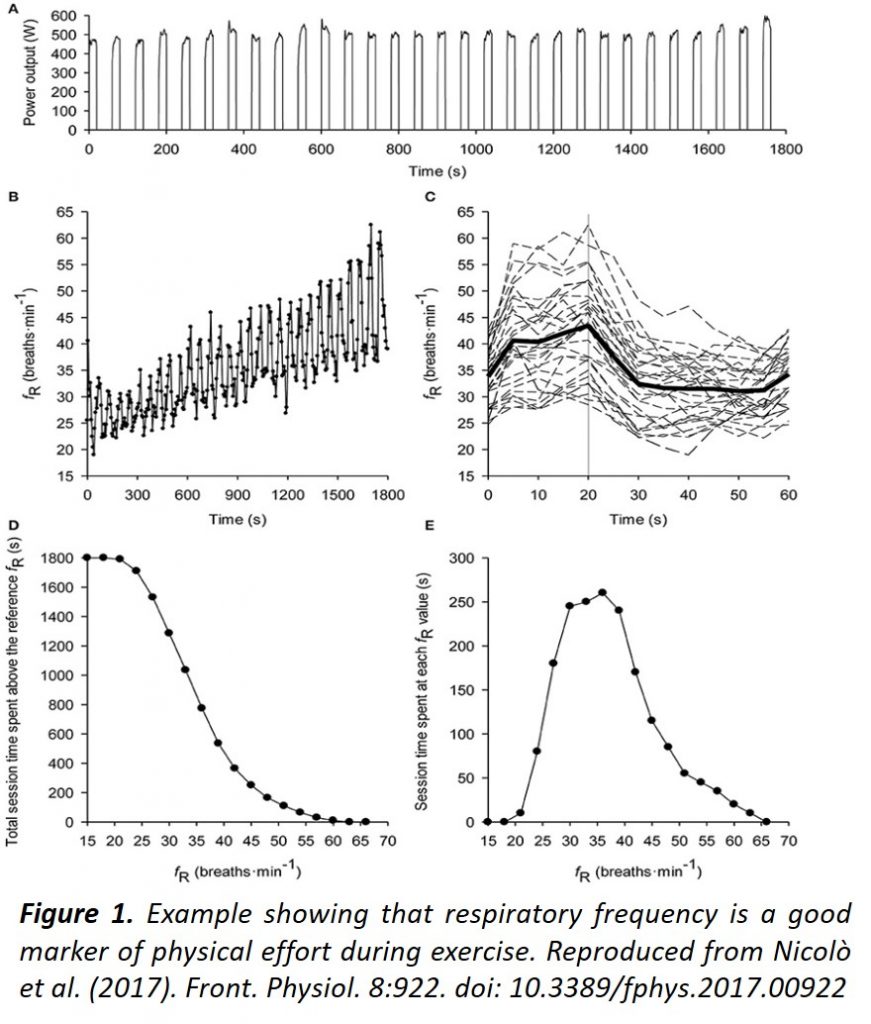Scope
Technological development is helping athletes and exercise practitioners optimize performance and minimize the risk of injury and illness. Yet, monitoring exercise is challenging due to several factors,  including motion artefacts and the need to minimize the invasiveness of wearable devices. The challenge is even greater when attempting to extract simple and useful information from a myriad of data that are currently gathered during training and competitions. Furthermore, most sensors and devices currently used in sports have not been scientifically validated. Moreover, technological development is often guided by market forces rather than athlete or scientific needs, which may reduce the use of new technologies. A good example of how the development of wearable sensors should follow athletes’ needs and be informed by scientific findings is given by the increasing attention devoted to respiratory frequency monitoring during exercise (see Figure 1 and the related paper).
including motion artefacts and the need to minimize the invasiveness of wearable devices. The challenge is even greater when attempting to extract simple and useful information from a myriad of data that are currently gathered during training and competitions. Furthermore, most sensors and devices currently used in sports have not been scientifically validated. Moreover, technological development is often guided by market forces rather than athlete or scientific needs, which may reduce the use of new technologies. A good example of how the development of wearable sensors should follow athletes’ needs and be informed by scientific findings is given by the increasing attention devoted to respiratory frequency monitoring during exercise (see Figure 1 and the related paper).
The main aim of this technical committee is to bridge the gap between applied scientists and sensor developers, by promoting fruitful interactions between researchers from different fields, sports companies, federations and clubs. More specifically, the committee aims at:
- Guiding the development of sports sensors by identifying relevant variables to be measured during exercise (e. g. respiratory frequency)
- Promoting validation of sports sensors by providing experimental and methodological support to sports companies
- Guiding the development of training metrics by ensuring that training constructs such as physical effort, exercise intensity, training load, training stress, fatigue, recovery etc. are correctly interpreted and measured
These aims may be pursued by organizing workshops, technical events, seminars, training courses, collaborations with the industrial sector, etc.
Chair
 Andrea Nicolò received his BSc (2009), MSc (2011) and PhD in Sports, Exercise and Ergonomics (2015) from the University of Rome “Foro Italico”. He is currently a post-doc researcher at the University of Rome “Foro Italico”. His research focuses on endurance physiology and performance, with special attention to the mechanisms and practical applications underlying the control of breathing during exercise. He has worked for different research projects funded by major national and international sports companies, with the aim of developing new exercise tests and training metrics, and of validating training devices and algorithms.
Andrea Nicolò received his BSc (2009), MSc (2011) and PhD in Sports, Exercise and Ergonomics (2015) from the University of Rome “Foro Italico”. He is currently a post-doc researcher at the University of Rome “Foro Italico”. His research focuses on endurance physiology and performance, with special attention to the mechanisms and practical applications underlying the control of breathing during exercise. He has worked for different research projects funded by major national and international sports companies, with the aim of developing new exercise tests and training metrics, and of validating training devices and algorithms.